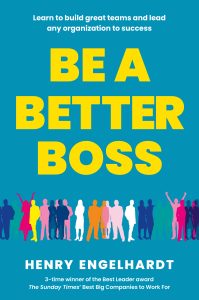Henry Engelhardt, above, founder and CEO emeritus of Admiral Group plc, has written a three-part analysis of what makes a successful businessman. In this opening piece, Henry considers what it takes to make a good leader. Two more pieces will be published later in January.
By Henry Engelhardt
What makes a GREAT leader? What do you need to do to create a GREAT business? Sadly, there is no magic formula for success. If there was, it would be easy, we’d all just follow the formula … two parts genius mixed over a hot flame with three parts energy …. Easy!
Fear not! I have given a lot of thought to what is needed to make a great business by being a great leader. I kept asking myself: what is the common denominator that ties great leaders, great organisations together?
I have reduced all the many ingredients to three things. In order to create a great business a great leader must:
- Make great decisions
- Be great with people
- Be creative; imaginative
That’s it! That’s all you need to do!
Part 1
Let’s start with making great decisions. There are four things at play here. First, you need to collect data and, most importantly, interrogate data. Too many times I have seen managers collect data but then take the data at face value, without interrogation, and end up making poor decisions.
Interrogating data is a skill. But it’s a skill that can be learned and once learned needs to be practised until you are good at it. Let’s say you are looking at a chart because you’ve been told you need to sack your worst three performing sales people. Sales conversion by sales person over the firsts eight months of the year. And there’s Fred, third from bottom of 20. Fred converts 14% of his contacts, meanwhile Sally is top of the chart with 24% conversion. Sally’s job is safe, eh? And Fred looks like he’s just under the water line. But before you give poor Fred the heave-ho, what are the questions you should be asking?
The first ones that come to my mind are: 1) is the chart the same if I look at each month individually? That is, perhaps Fred is currently converting 25%, ahead of Sally in the latest month, but he had a very slow start to the year. You might actually want to reward him for improving month-on-month to the point where he is now leading the team in conversion. Sadly, this is not reflected in the 12-month chart. 2) how many conversions are there? If Fred had two more conversions over the eight months would his conversion rate be 14.1% or 25%? If Sally had three fewer conversions, would she still be top performer or perhaps fall below Fred? You need to understand how many data points are driving the figures.
These are just the first two questions that come to mind. However, far too often I see managers making decisions without asking ANY questions. They would look at the data and sack Fred. But they might be making a big mistake.
Start today practicing data interrogation. Look at data with a different eye, one that is keen to ask for clarity.
Second step in making great decisions is the Team, the Team, the Team. Use the people around you. Ask people what they think. Get lots of opinions and ideas and then synthesize these thoughts and reach your own conclusions. Just explaining the situation to people can often light the lightbulbs in your own head and help you to see things from other points of view.
How many people should you talk with? That depends on the size of the decision coupled with the intractability. That is, if it’s a 25-year property lease with no breaks, it’s a big decision that cannot easily be undone. Ask LOTS of people! If it’s something that isn’t that important and/or if it doesn’t work can be undone in an hour, just ask a couple of people. But I guarantee that every time you talk with someone, they’ll have a different view, or think of something you hadn’t thought.
Third step is: keep earth in the window. That is, always tie your decisions back to your long-term goals. In the movie Apollo 13 the beleaguered astronauts had to propel themselves back into Earth’s atmosphere without any guidance systems. So, they kept Earth in the window and piloted the ship that way. Same for making decisions: your short-term decisions should always support your long-term goals.
Lastly, to make great decisions you must make the decision! When I would talk with managers who were going back and forth on a decision after a while I would take the world’s greatest decision-making tool from my pocket: a coin. And I’d say, ok, I’ve heard enough. Heads we do A, tails we do B. That’s it. My how that sharpened the manager’s ability to make a decision!
I’ve also seen managers collect date. Interrogate data. Collect more data. Further interrogate the data. More data. You get the picture. At some point you MUST make the decision and move on.
 Henry Engelhardt is the founder and CEO emeritus of Admiral Group plc. He started the insurance company in the early 90s (it was called Admiral so that it would appear at the top of the Yellow Pages’ listings). Originally American, Henry settled in Wales attracted by the tax breaks the region offered to set up new enterprises. Today, Admiral is headquartered in Cardiff and is the the only FTSE 100 company in Wales. It is the 50th largest listed company in the UK. Moreover, it has been consistently included in the Sunday Times Best Companies to Work in the last 20 years. Henry’s new book, Be a Better Boss: Learn to build great teams and lead any organisation to success, is published by whitefox publishing.
Henry Engelhardt is the founder and CEO emeritus of Admiral Group plc. He started the insurance company in the early 90s (it was called Admiral so that it would appear at the top of the Yellow Pages’ listings). Originally American, Henry settled in Wales attracted by the tax breaks the region offered to set up new enterprises. Today, Admiral is headquartered in Cardiff and is the the only FTSE 100 company in Wales. It is the 50th largest listed company in the UK. Moreover, it has been consistently included in the Sunday Times Best Companies to Work in the last 20 years. Henry’s new book, Be a Better Boss: Learn to build great teams and lead any organisation to success, is published by whitefox publishing.


